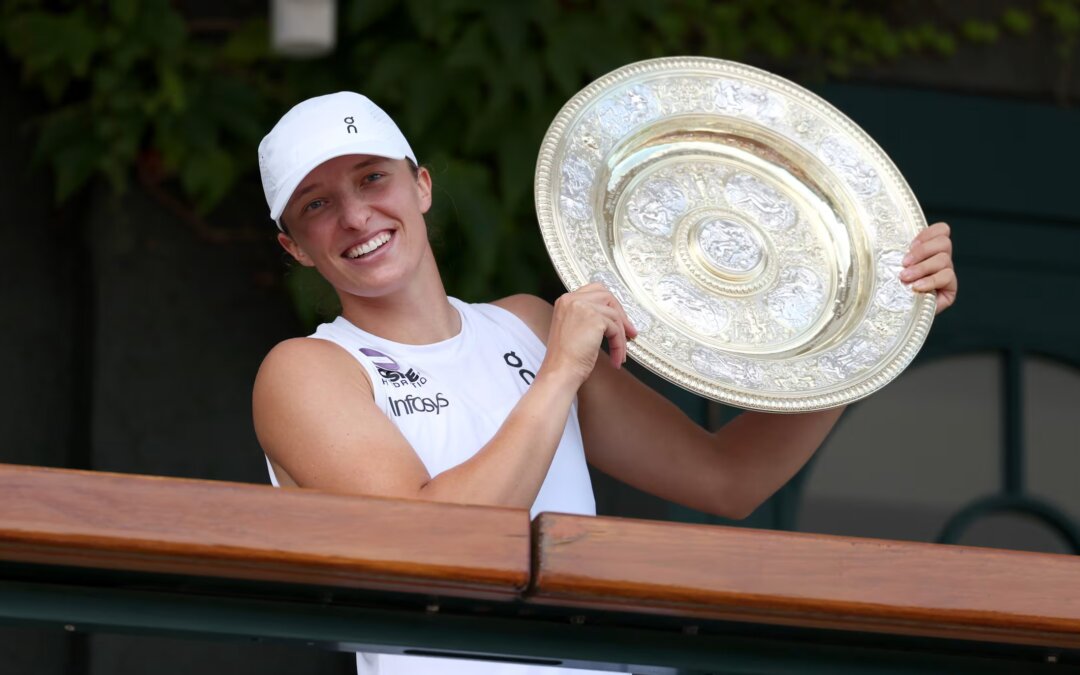In a performance that will echo through Wimbledon’s storied history, Iga Swiatek dismantled Amanda Anisimova 6–0, 6–0 in just 58 minutes on Centre Court to capture her first Wimbledon crown and sixth Grand Slam title. The Polish star, long celebrated for her clay-court dominance with her four Roland Garros titles, completed her transformation into a true all-surface champion with a display of clinical precision and relentless pressure that left Anisimova searching for solutions she could not find in what was her maiden Grand Slam final.
Swiatek became only the second woman in the Open Era to win a Grand Slam final with a “double bagel,” following Steffi Graf’s 1988 Roland Garros victory, and the first to do so at Wimbledon since 1911. Her path through the tournament was remarkable, dropping only 35 games across the fortnight, the fewest by any women’s champion at Wimbledon since Martina Navratilova in 1990, and conceding just two games combined in the semi-final and final. This victory also extends Swiatek’s perfect Grand Slam final record to 6–0.
A ruthless symphony
The match itself was a one-way procession. Swiatek opened with a near-perfect game, winning eight of the first ten points. The third game brought brief resistance, but Swiatek absorbed the few errors she made, broke again, and quickly shut down any hope of a contest. Losing just two points across the next three games and closing out the set with consecutive love holds, the Pole completed her 12th 6–0 set of the 2025 season with authority. From there, it became a match of survival for Anisimova, as Swiatek earned at least one break point in every Anisimova service game and never allowed the American to settle. From the baseline, Swiatek was supreme, moving with lightning footwork, serving with precision, and stepping in to take the ball early, finishing the match with a decisive backhand down the line that crowned her Wimbledon champion without dropping a single game.

Swiatek’s game plan was clear from the outset: dominate the baseline, attack early in rallies, and pressure Anisimova’s second serve relentlessly. She won 78% of her first-serve points compared to Anisimova’s 45% while converting six of the nine break points she created. Anisimova struggled under the weight of the occasion, producing 28 unforced errors, failing to create a single break opportunity, and winning just 13 points on her serve.
“It seems super surreal.”
Speaking after her victory, Swiatek reflected on her journey to mastering grass courts. “Honestly, I didn’t even dream about this. Especially after a season with a lot of ups and downs and a lot of expectations from the outside, I didn’t really imagine winning Wimbledon,” she admitted, her voice shaking as she held the Venus Rosewater Dish aloft. “I was always comfortable on clay, but grass felt like another world. I kept trusting the process, and today, it all came together.”
This triumph on the lawns of Wimbledon marks a significant milestone in Swiatek’s career, adding to her four French Open titles and 2022 US Open crown. The only major missing from her collection now is the Australian Open, a goal she hinted at in Polish media following her victory. “Winning Wimbledon was the last on my wish list. Now I have to keep believing that everything is possible.”
Much of her improvement on grass has been attributed to her work with Wim Fissette, who joined her team late last year and helped her adjust her stroke mechanics to hit flatter, more aggressive shots that penetrate the slick surface. But her primary weapon throughout this tournament was her serve, which clocked speeds up to 123 mph with consistency that rivaled even the likes of Sabalenka. Behind these cannon-like deliveries, Swiatek transitioned to the net with purpose, used more flat shots than her usual heavy topspin, incorporated effective slices, and played fearless attacking tennis to complement her formidable baseline game.
The final’s significance extended beyond personal triumph for Swiatek, as she became the first Polish player, male or female, to win a Wimbledon singles title in the Open Era. The victory was witnessed by a capacity Centre Court crowd that included the Princess of Wales, who presented Swiatek with the trophy, as Polish flags waved and chants of “Iga! Iga!” filled the air during her lap of honour.
Anisimova, gracious in defeat, reflected on her experience: “Iga played unbelievably today. I was nervous, and I couldn’t find my rhythm, but I’ll learn from this. It’s hard to take a loss like this, but it’s part of the journey.”

At just 24 years old, Swiatek has now won majors on clay, hard, and grass courts, joining an elite group of players to achieve this feat. “I always thought grass was not for me,” Swiatek said in her press conference, smiling through tears. “Now, it feels like maybe it is.”
As she waved to the crowd, tears in her eyes, Swiatek knew she had not only won a trophy but conquered a surface, a narrative, and a dream that once felt out of reach. Her historic victory will be remembered not only for the ruthless scoreline but for the message it sends: Iga Swiatek is ready to rule everywhere.

